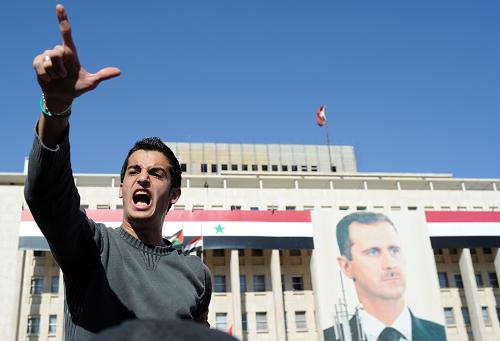West further complicates Syria crisis
 0 Comment(s)
0 Comment(s) Print
Print E-mail Xinhua, February 8, 2012
E-mail Xinhua, February 8, 2012
During a UN Security Council meeting on Saturday, Russia and China vetoed a draft resolution on Syria, which urged President Bashar al-Assad to hand over his power.
After the vote, French President Nicolas Sarkozy made a statement saying that France will seek further international support of the Arab initiative on Syria through setting up a liaison group.
However, many international experts believed that forcing al-Assad to step down goes against both the UN Charter and may cause further turmoil in the Arab country stricken by protracted conflicts.
Dialogue urged
George Gabbour, an international political analyst and former parliamentarian in Syria, said in a telephone interview with Xinhua that the vetoes from Russia and China were "a new invitation for all Syrian parties to embark on a dialogue, which is the best solution to the current crisis."
Those who rejected the dialogue desired nothing but further violence and bloodshed, he added.
Gabbour also pointed out that a regime change imposed from outside was not in the interest of the majority of Syrians, especially when they were supporting a political reform rather than a regime change.
Abdelfattah Elsonoty, a Cairo-based expert on international relations, said even those Syrians who took to the street to call for reform were actually opposing Western powers' intervention.
Elsonoty also said that a military intervention by the West and some Arab countries could bring great uncertainty to the situation in Syria.
Instability spillover
Syria is located in the center of the Arab-Islamic area in Western Asia, surrounded by Lebanon, Jordan, Iraq and Turkey. Due to its unique geographic location, analysts believed that a forced regime change in Syria would have a serious impact on the political situation in Iran, Lebanon and Palestine, and even change the political landscape in the whole Middle East.
Elsonoty said military interference in Syria would cause negative effects for its neighboring countries. A regime change in Syria would threaten regional and domestic stability in Lebanon, while a large amount of Syrian refugees will rush into the neighboring countries, putting more security and economic burdens on them.
Hidden agenda
Behind the excuse of "for democracy and liberty of the Middle East," the real motive of the western countries is to change the political landscape of the whole Middle East area for their own benefit.
On one hand, bringing down the Syrian government will increase the West's chips on the Iranian issue as Syria and Iran enjoy close relations.
On the other hand, the United States, a strong patron of Israel, also hopes to instill a new regime in Syria which distances itself from Iran and becomes less hostile to Israel and the West.
Gabbour said the main reason why the Western powers were pushing for a regime change in Syria was "Syrian didn't sign the peace accord with Israel and it firmly supported the movement against Israel's occupation in this area."
Explaining its veto of the UN Security Council draft resolution, Russian Foreign Minister Sergei Lavrov said that any resolution on Syria should be acceptable to all Syrian parties before it was brought to a vote at the UN Security Council.






